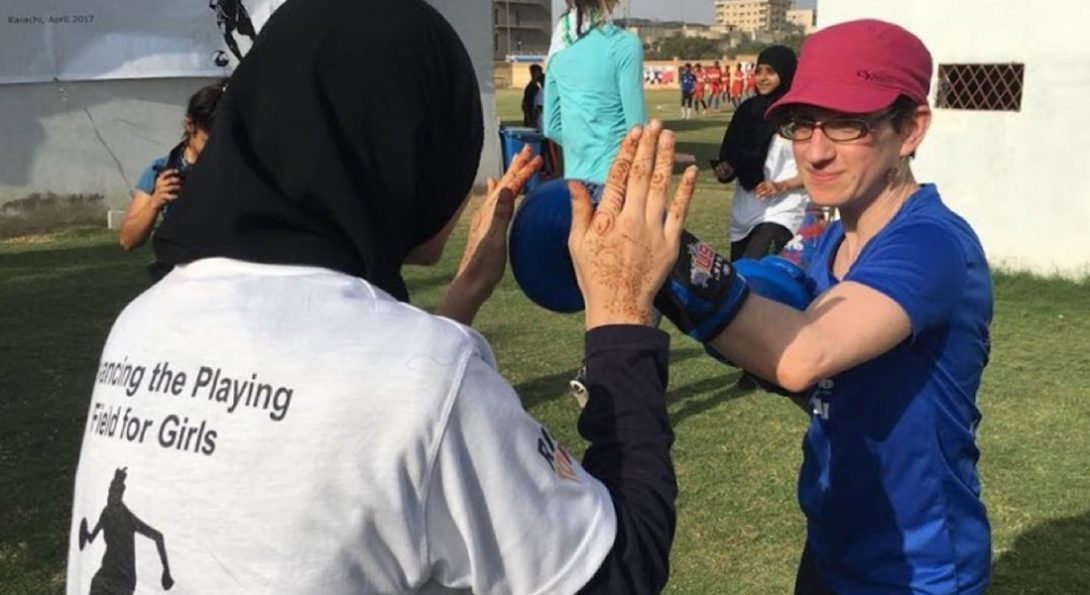JACSW Alum Learns From Girls Sports Programs in Pakistan

What do girls sports programs in the U.S. have in common with those in Pakistan? More than you might think, especially when it comes to empowering girls and young women.
That’s what JACSW alum Elizabeth Tumiel, MSW ‘07 discovered when she travelled to Pakistan in April 2017. Tumiel is programs director at Girls in the Game (GiG), a Chicago-based organization that helps girls find their voice and discover their strength through sports, health and leadership programs. GiG was part of a U.S. Embassy-funded Global Exchange, organized by Women Win and Right to Play Pakistan. The U.S. envoy made site visits to exchange information and best practices with a girls sports programs in Pakistan.
The envoy was in Pakistan for a little over a week, and made visits to seven girls sports programming sites in the cities of Islamabad and Karachi. “Anytime we made a site visit, the first thing we did was to play with the girls, to engage in their curriculum or their sport, which was awesome,” explains Tumiel. “It was a smart strategy that Right to Play developed because the girls were often nervous to be around us at first. But when you get a bunch of people together and start playing a game, then barriers start to come down and you can have a conversation.”
While in Pakistan the group visited several cultural sites, including Faisal Mosque. They also attended a conference on breaking barriers to girls’ involvement in sports, with presentations by 12 Pakistani and American organizations that are implementing girls only sports programs.
Information Exchanged and Lessons Learned
At most of the site visits they talked not only with the people implementing the program, but also with the girls participating in the program. “We actually found that the curricula in use over there aren’t all that different from what we’re using in the U.S., so that was really interesting,” says Tumiel. “We also saw that some of the gender issues were less prevalent for people with greater access to wealth, as compared to poorer communities which have more of a need, which is also similar to Chicago or the U.S.”
The programs they visited had participants as young as five years old, and they found some of the programs using a leadership model in which older team members serve as coaches to the younger girls, which helps develop their leadership skills. This is very similar to the program at GiG in Chicago, with an important difference.
“Every organization we visited involved people from that locality,” explains Tumiel. “And you could tell how important that was, for the young girls to see young women leaders, which gives them the ability to see themselves as becoming leaders. It made me think about my own program in the U.S. and how we should focus on getting more of our coaches from the community, whether its parents, school staff or other community members.”
Tumiel says that since returning to the U.S. she has been in touch with her counterparts in Pakistan about “bringing the work we did in Pakistan back to the U.S., sharing ideas about curricula and program evaluation, because we’re a little bit further along on the evaluation side.”
Drawing Inspiration from the Experience in Pakistan
Some of what Tumiel saw while visiting Pakistan was humbling and inspiring. She tells the story of meeting a woman swimmer who was an Olympic medalist. “But when she was a young girl her small village had been taken over by a religious leader who banned women from swimming in the pool,” Tumiel recounts. “So for a number of years she did swimming exercises with no pool. I mean, how do you do that?
“Ultimately the pool was reopened to women, and she was able to start swimming again,” Tumiel continues, “and she did it so ferociously that she ended up becoming an Olympic medalist. That gave me a really good perspective on the idea of resilience, and it made me think about the girls we work with in Chicago. And not only about their needs or their deficits, but how they use their challenges as strengths that can position them in a better place than girls who haven’t faced similar challenges.”
Tumiel was also very impressed by the passion she saw in the communities she visited. “It was really eye-opening and inspiring to see so many people who were so dedicated to this work. A lot of those people aren’t paid for it, but they are passionate about getting the work done,” she says. “It inspired me to think about my own passion for this work and reconnect with the reason I do this work. It was a life changing experience!”